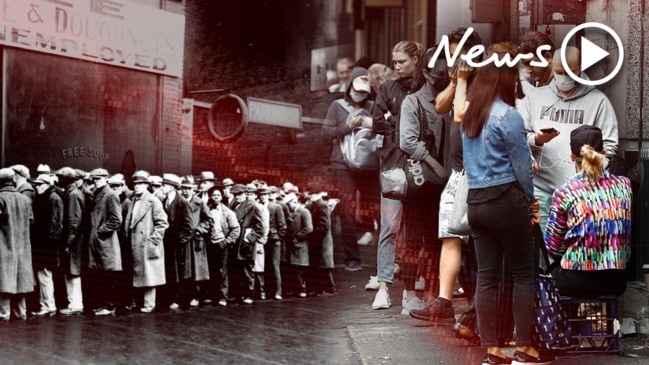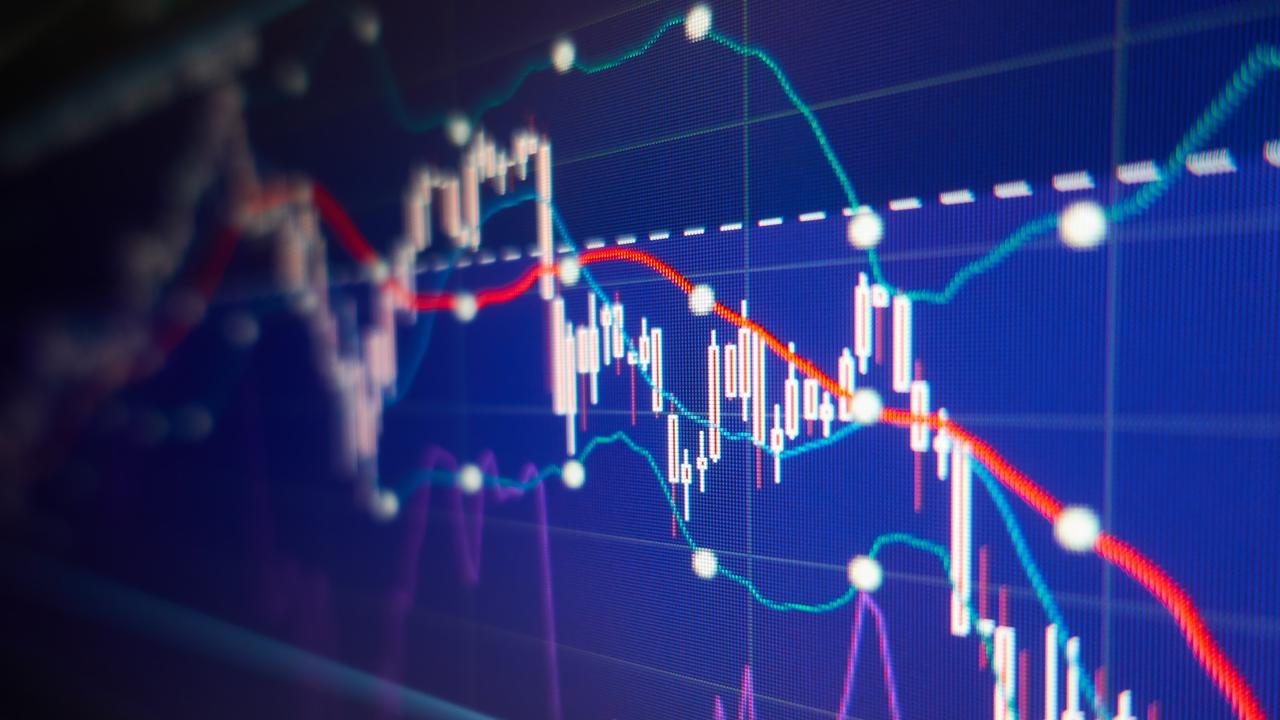Coronavirus: How an economic recession affects wages, jobs, food prices
The coronavirus crisis has officially plunged Australia into recession – and it’s going to affect jobs, wages, the cost of living and the housing market.

The coronavirus crisis has pushed economies to the brink, with Australia now plunged into a recession for the first time in 29 years.
The release of the June national accounts data this morning revealed the catastrophic extent of the coronavirus crisis.
Data paints a picture of an economic bloodbath, with the economy contracting by a staggering 7 per cent through the quarter. That’s the worst-ever result.
It follows a modest 0.3 per cent contraction in the March quarter.
So far we’ve seen the Reserve Bank slash interest rates to a new record low of 0.25 per cent and announce a slew of other economic measures designed to soften the blow, while a six month deferral of loan repayments for struggling small businesses was also announced this year.
Our major banks have also stepped in and revealed a string of policies to help Aussies weather the storm that’s brewing.
But what will a recession really mean, and how will it affect our everyday lives?
RELATED: Banks letting Aussies ‘pause payments’
RELATED: Relief for renters impacted by virus
Dr Andrew Grant, senior lecturer at the University of Sydney Business School, told news.com.au there would be some “spillover effects” that would affect the average Aussie during a recession.
“It’s going to be a lot harder for anyone with a job to change jobs, and there will be lower growth in wages. If we see higher unemployment, we may also see lower levels of inflation but that might not necessarily be a good thing in the long run,” he said.
“Small businesses will have to strike a balance between remaining operational and closing – even if there are extensions to loans or deferred payments, there are other costs businesses are going to incur, so can small businesses justify keeping the lights on when they’re not getting as many customers through door? That’s going to be a challenge.”
He said it would be increasingly difficult for businesses to raise prices when customers couldn’t afford it, so a “real stagnation” on the cost of everyday items could be on the cards.
But on the other hand, if businesses saw their costs increase, they may be forced to pass the cost on to consumers.
Dr Grant said the real challenge would be surviving a period of unemployment or “below average employment” for those in part time or casual jobs who may have a reduction in hours – and therefore wages.
He said personal finance gurus had long been pushing the need for everyone to have an “emergency fund” of savings to lean on during tough times – and that many of us might need to draw on them in the months to come.
For those who have no savings available, he said it was important to spend time coming up with a contingency plan, to consider taking out a personal loan and to speak to your bank or service provider straightaway if you experience financial hardship, as companies often had mechanisms to help struggling customers.
Dr Grant said low interest rates could have a “slightly positive impact” on property prices but that those with cashflow issues who had investment properties might put them on the market to free up some cash.
“Suddenly paying 80 per cent of your pay on three mortgages might not seem like a good idea, so we could expect that to lead to bigger supply, especially of units,” he said.
“But it depends on how long this lasts, because there are costs associated with selling property so it’s not the first thing people turn to.”
He said most of us would cut back our discretionary spending on unnecessary luxuries like holidays and cars, and that now was the time to invest in your personal development by learning new skills as the jobs market worsens.
Meanwhile, Deloitte Access Economics partner Chris Richardson said a recession was now the most likely outcome, and that it would resemble the GFC in terms of an increase in the unemployment rate and 180,000 job losses in six months’ time.
But he said it wouldn't resemble the recessions of the 1980s and 1990s which saw the unemployment rate – which is currently 5.3 per cent – rise into double digits.

“Essentially everyone is doing the right thing – the government is hurling money at the problem and the RBA is doing the same,” he said.
“It helps that the Aussie dollar is lower in terms of protecting jobs, and so does lower petrol prices and the fact that it has been raining so farmers will finally have a better year.
“But even allowing those things, the most likely thing is a recession in Australia in terms of an increase in the unemployment rate and the loss of jobs – it will start to look similar to the GFC with about 180,000 jobs lost and an increase in unemployment six months from now.
“But with this problem, you can’t just make it go away even if governments are perfect. And 98.5 out of every 100 people in a job today will still have a job in six months’ time.
“I’m not saying it’s nothing for those 1.5 people, but it needs to be put into perspective as it’s a similar size to what happened in the GFC, and we did better out of that than other parts of the world, and there are also many more people employed now than was true at that time a decade ago – employment has been the biggest Australian success story of the last decade.”
Mr Richardson said it would be “pretty tough” for those that did lose their jobs, and that governments were responding by considering a “welfare wage” and putting more money into existing unemployment benefits.
But he said the most important focus was to protect the community’s health, which would in turn help the economy.
“We’re all in it together and once this crisis is over – and it will be over – we want to be able to look each other in the eye with pride and genuinely say we came together as a team.
“It’s going to hurt … and the best protection we can give to ourselves, our loved ones and everyone else is to keep doing things like washing our hands and standing a bit further away – that will slow down the spread of the virus and save lives and jobs,” he said.
“The world has changed, and we need to wake up to the fact that it has changed. We are living with a new and nastier flu that’s more contagious and dangerous than the flu we know. Down the track we will have vaccines and antiviral medication to help us feel better even if we get it, and stuff will go back to normal.
“There will most likely be six months of terrible disruption – and Boris Johnson said we will lose some loved ones before their time – but this is nobody’s fault and if you think it is, you are part of the problem and you need to be part of the solution.”
He said we all needed to “share the pain” and that in the weeks and months to come, we would likely see unprecedented measures taken, such as governments potentially buying businesses to stop them going under, which can then be sold back once the crisis is over.
“We want the other side of the crisis to look as much as possible like the Australia of February and that will require things that might surprise you, but don’t assume they are mistakes. The world has changed, and we need to think fast, think big and think laterally and support each other.”




